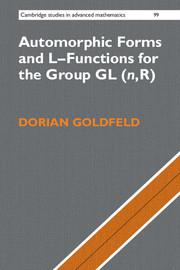Book contents
- Frontmatter
- Contents
- Introduction
- 1 Discrete group actions
- 2 Invariant differential operators
- 3 Automorphic forms and L–functions for SL(2, ℤ)
- 4 Existence of Maass forms
- 5 Maass forms and Whittaker functions for SL(n,ℤ)
- 6 Automorphic forms and L-functions for SL(3, ℤ)
- 7 The Gelbart–Jacquet lift
- 8 Bounds for L-functions and Siegel zeros
- 9 The Godement–Jacquet L-function
- 10 Langlands Eisenstein series
- 11 Poincaré series and Kloosterman sums
- 12 Rankin–Selberg convolutions
- 13 Langlands conjectures
- List of symbols
- Appendix: The GL(n)pack Manual
- References
- Index
4 - Existence of Maass forms
Published online by Cambridge University Press: 22 August 2009
- Frontmatter
- Contents
- Introduction
- 1 Discrete group actions
- 2 Invariant differential operators
- 3 Automorphic forms and L–functions for SL(2, ℤ)
- 4 Existence of Maass forms
- 5 Maass forms and Whittaker functions for SL(n,ℤ)
- 6 Automorphic forms and L-functions for SL(3, ℤ)
- 7 The Gelbart–Jacquet lift
- 8 Bounds for L-functions and Siegel zeros
- 9 The Godement–Jacquet L-function
- 10 Langlands Eisenstein series
- 11 Poincaré series and Kloosterman sums
- 12 Rankin–Selberg convolutions
- 13 Langlands conjectures
- List of symbols
- Appendix: The GL(n)pack Manual
- References
- Index
Summary
Maass forms for SL(2, ℤ) were introduced in Section 3.3. An important objective of this book is to generalize these functions to the higher-rank group SL(n, ℤ) with n ≥ 3. It is a highly non-trivial problem to show that infinitely many even Maass forms for SL(2, ℤ) exist. The first proof was given by Selberg (1956) where he introduced the trace formula as a tool to obtain Weyl's law, which in this context gives an asymptotic count (as x → ∞) for the number of Maass forms of type ν with |ν| ≤ x. Selberg's methods were extended by Miller (2001), who obtain Weyl's law for Maass forms on SL(3, ℤ) and Müller (2004), who obtained Weyl's law for Maass forms on SL(n, ℤ).
A rather startling revelation was made by Phillips and Sarnak (1985) where it was conjectured that Maass forms should not exist for generic non-congruence subgroups of SL(2, ℤ), except for certain situations where their existence is ensured by symmetry considerations, see Section 4.1. Up to now no one has found a single example of a Maass form for SL(2, ℤ), although Maass (1949) discovered some examples for congruence subgroups (see Section 3.15). So it seemed as if Maass forms for SL(2, ℤ) were elusive mysterious objects and the non-constructive proof of their existence (Selberg, 1956) suggested that they may be unconstructible.
- Type
- Chapter
- Information
- Automorphic Forms and L-Functions for the Group GL(n,R) , pp. 99 - 113Publisher: Cambridge University PressPrint publication year: 2006

